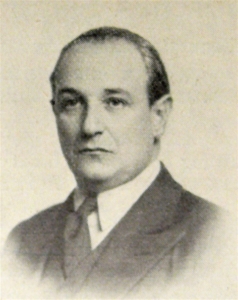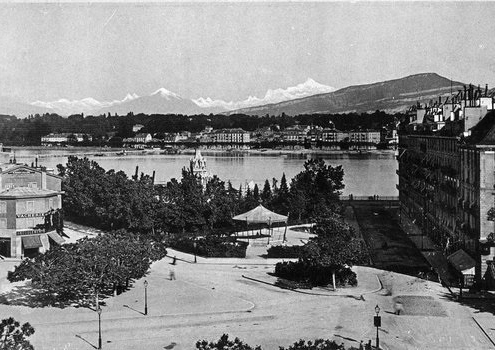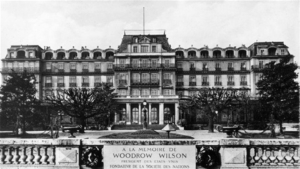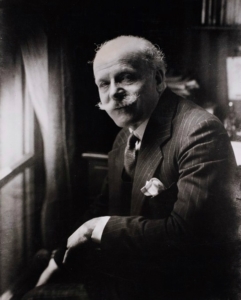 István (Stefan) LUX
István (Stefan) LUX
(1888-1936)
The Scout of Consciences.
On 3 July 1936, the Czech journalist István (Stefan) Lux shot himself in the middle of the session of S.d.N ( Societe des Nations) in Geneva, to alert the world to the dangers of the Nazi regime.
A look back at the touching story of this man:
Youth

Stefan Lux was born on November 4, 1888 in Malacky, Austro-Hungary, where his father was a notary. He completed his gymnasium in Bratislava and began to study law at the University of Budapest. But after two exams, he decided to practice acting.
He left for Vienna where he met the old tragic Joseph Kainz, the last favorite of Ludwig II of Bavaria. There he received the teaching of the comedian and director Ferdinand Gregori and at twenty-three years old was engaged to the Deutsches Theater of Berlin. He published a first volume of poems: ‘’Meine Lieder’’ – which will have three reeditions – under the pseudonym of Peter Sturmbusch.
Then we find him on the stage of the Neue Bühne in Vienna, for the seasons of 1913 and 1914, when the war broke out. He’s committed. After being hit by the typhus, a bullet reaches him in the lung. Barely recovered, he returned to the front and was injured badly again, to the point of losing several months the use of an arm. He ended up an officer in the Hungarian army.
Theater man
After the war, Lux left for Berlin and began his work on behalf of the abused Jews. In autumn 1919, he created the Sozial-Film GmbH, which, under his artistic direction, produced one of the first films devoted to the fight against anti-semitism: ‘’Gerechtigkeit’’ (Justice).
Lux obtained the support of Professor Julius Hirsch, Rudolph Schildkraut got the first role, and secondary ones went to Ernst Deutsch, Fritz Kortner, Hans Heinrich von Twardowski and Maria Zelenka among others. The film was shot in Goslar and Nuremberg, and financed by the owner of a department store in Berlin.
In March 1920, the film was finished and ready to be screened in theaters, when the Kapp Putsch broke out. The premiere was postponed by the events and the donor withdrew his support. ‘’Gerechtigkeit’’ was forgotten. Lux still stayed in the cinema for some time, working as a screenwriter for the production company of the actress Henny Porten and for the Wengeroff-Film, as well as for several publishing houses, and then became a freelance writer.
In 1921 he published ‘’Liebeslieder’’, a new volume of his poems – the subject of musical adaptations by the composers Vilma von Webenau, Erwin Bodky, Otto Siegl, etc. He rediscovered and published in 1923 a new farce, ‘’Nur Keck’’, by Johann Nestroy – the Viennese ‘’Feydeau’’. But he was especially passionate about his research on the philosopher Popper-Lynkeus
Lux now had his family — his wife Dora and their son Albert born in 1922 — and struggled to live on his pen because his visionary articles in which he announced everything that will indeed happen, regularly return from the editorial offices, with the mention « Inopportune » or « Not to say ».
Lux planned to publish a journal: ‘’Weltbühne des kleinen Mannes’’ (World Stage of the Little Man), but it remained a project: Hitler had just come to power and he must go into exile.
Return to home country
He returned to his homeland, then Czechoslovakia, and settled in Prague, his furniture and belongings remaining in Berlin, seized by his owner. He has a new project: set up a theater. A Jewish theater, with Jewish plays that, as in ‘’Gerechtigkeit’’, will denounce the injustices suffered by the Jews. He managed to stage two or three performances in his Jüdisches Kammerspiel.
Hitler’s politics was spreading in Germany and escalating in Eastern Europe, the S.d.N. was powerless. Lux is sure: public opinion must be shaken, world leaders must react, and Jews must be encouraged to resist. Lux decided to come to Geneva, to be admitted to the Council Chamber and, at a meeting, to give before the astonished statesmen an inflamed speech of warning and awakening of consciences.
Final preparations
He collected the necessary sum for the trip and on June 4 1936 Arne Laurin, an editor-in-chief of the Prager Presse and a personal secretary of Tomas Masaryk – gives him a letter of recommendation with the journalist Paul Du Bochet.
He stopped first in Paris, to collect in the circles of emigrants, what to splash out in his Geneva intervention. But he hardly would be listened to.

Alpes place, Geneva
In Geneva, where he arrived on 26 June, he was welcomed by Du Bochet who provided him with a press card to attend the S.d.N. sessions. Lux understands: in front of that assembly any inflamed speech would have no result.
In his room of the Pension Elisabeth, place des Alpes, Lux took his decision. He expected to be listened to by Anthony Eden, Britain’s foreign minister, who – despite the German-British naval agreement – was the only one able to stop the infernal machine.
On the night of Tuesday 30 June to Wednesday 1 July, he drafted what he called his Memorandum in the form of a letter to Sir Eden. In that letter, he was explaining the motives behind his act and emphasizing its importance by his desperate gesture. He denounced Germany’s rearmament and predicts a “global disaster.”
On the 2 of July, he wrote some more letters, to his wife, to Du Bochet, to Doctor Heller of Prague to recommend his wife and their son to his benevolence, to King Edward VIII, to the Times, to the Manchester Guardian, to the Paris Intransigeant. In the evening, he settled his pension bill, wrote his will, and prepared a final letter, addressed to the Secretary General of the League of Nations, Joseph A. Avenol, to apologize for the inconvenience and entrust him with the routing of the other letters.

The League of Nations
Suicide
On the morning of Friday, 3 July 1936, at the Council Chamber, the delegates met for the sixteenth session of the League of Nations (S.d.N.). The main topic of discussion was the reform of the Covenant of the League of Nations.
At half past ten, when Spanish delegate Augusto Barcia had just finished his speech and the interpreter began the English translation, a shot was heard. The Czech writer Stefan Lux made a gesture towards the president (Paul Van Zeeland) released a revolver and collapsed after having managed to articulate a few words. Van Zeeland immediately interrupted the session and asked if there was a doctor in the room. Canadian delegate Roy rushed to the wounded. The staff of the room transported the wounded into another room reserved for the Secretariat, while the Chief of Police Corboz arrived with the group of policemen.
And the President reopens the meeting after giving the only information he had: the drama was not related to the current debate.
Dr. Weber-Bauler, a doctor at the League of Nations, examined Lux and ordered his immediate transfer to the hospital. In the ambulance his compatriot László Benes collected the last confidences of Lux. The chief rabbi of Geneva, Salomon Poliakof, arrived at Lux’s request. And, after having declined his Hebrew name – Shmuel Moshe ben Abraham – Lux asked to be buried among the Jews. Doctor Jentzer tried the impossible but Stefan Lux succumbed the same evening at nine o’clock.
Within hours, the whole world, even in America, had learned a gesture of the one, a newspaper called “the Hero of Geneva’’, and had heard his message.
Robert-Edward DELL, editor at the Manchester Guardian

Robert-Edward DELL, editor at the Manchester Guardian
Tributes
At the funeral at the Jewish cemetery in Veyrier, a large crowd and famous personalities were present. Robert Dell, editor at the Manchester Guardian and president of the International Press Association accredited to the League of Nations, concluded the tributes as follows: « Stefan Lux, what can we say about your gesture? Unnecessary gesture perhaps, but heroic gesture, gesture of supreme self-sacrifice. In front of your coffin we can at least assure that we will never abandon the cause of human solidarity, for which you have sacrificed your life, and that we will never be indifferent facing the crime. »
A month later, as the World Jewish Congress was born in the very room where Lux had committed suicide, Nahum Goldmann declared: «One day in Germany monuments in memory of Stefan Lux will be built « .
Paying tribute to his cause but condemning his action, Swiss writer and journalist Léon Savary concluded: « Men who are capable to fight for justice must not kill themselves, they must stay in their posts ».
*****
The original article is written in french and presented by Jean Plançon.
©Jean Plançon/Patrimoine juif genevois 2018
Kind translation by Marina KREYMERZAK, member of Patrimoine juif genevois.
©Marina Kreymerzak/Patrimoine juif genevois 2021
References
- The movie’’ Amen. ‘’de Costa-Gavras (2002) begins with the gesture of Stefan Lux.
- Radio Praha broadcast on July 22, 2011 the program « 75 years since the unsung sacrifice of Stefan Lux »
- Jean Plançon, in his book Histoire de la Communauté juive de Carouge et de Genève, volume 2, at the Slatkine editions, Geneva 2010, dedicates chapter XII to « Stefan Lux, The Scout of Consciences»


